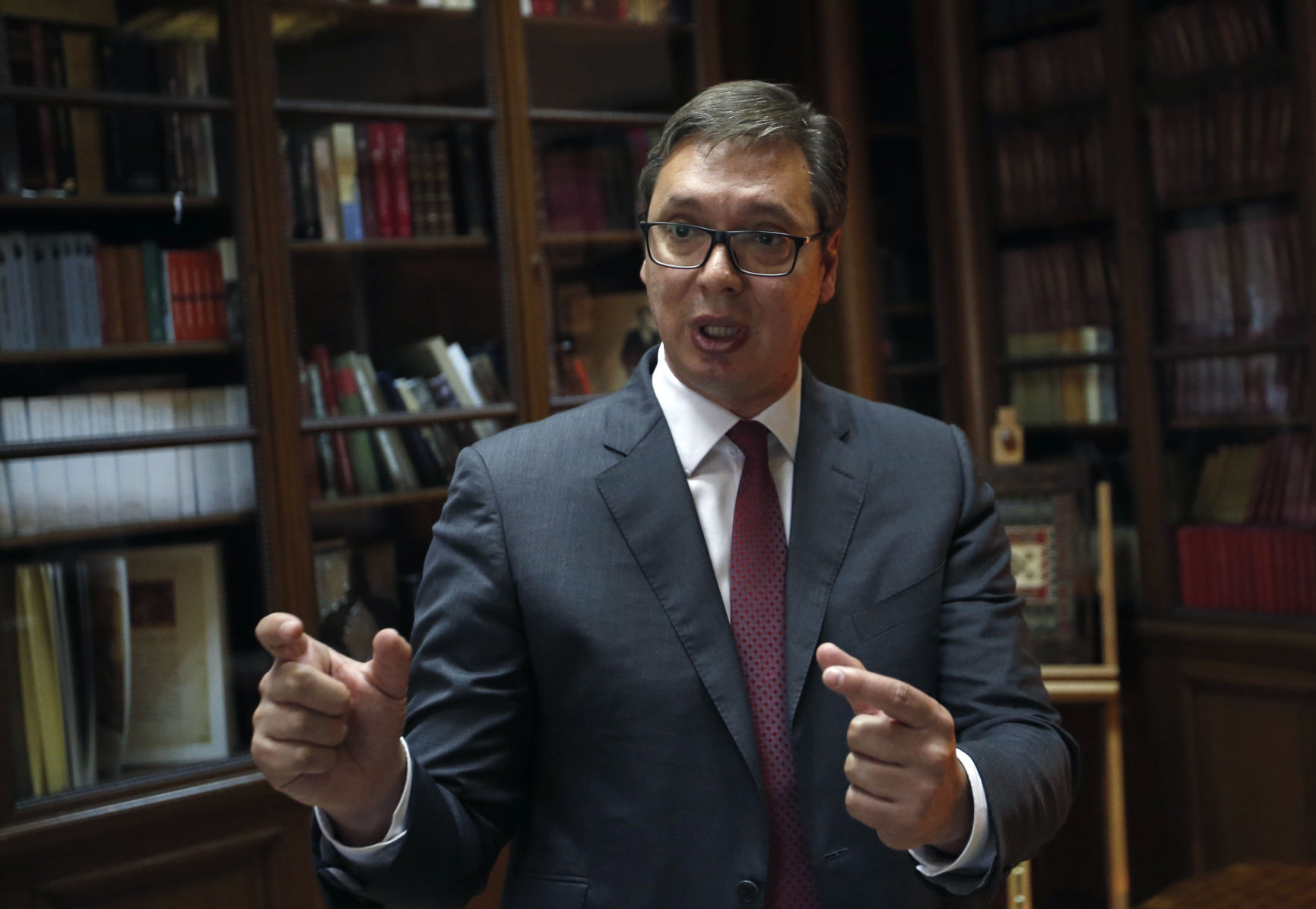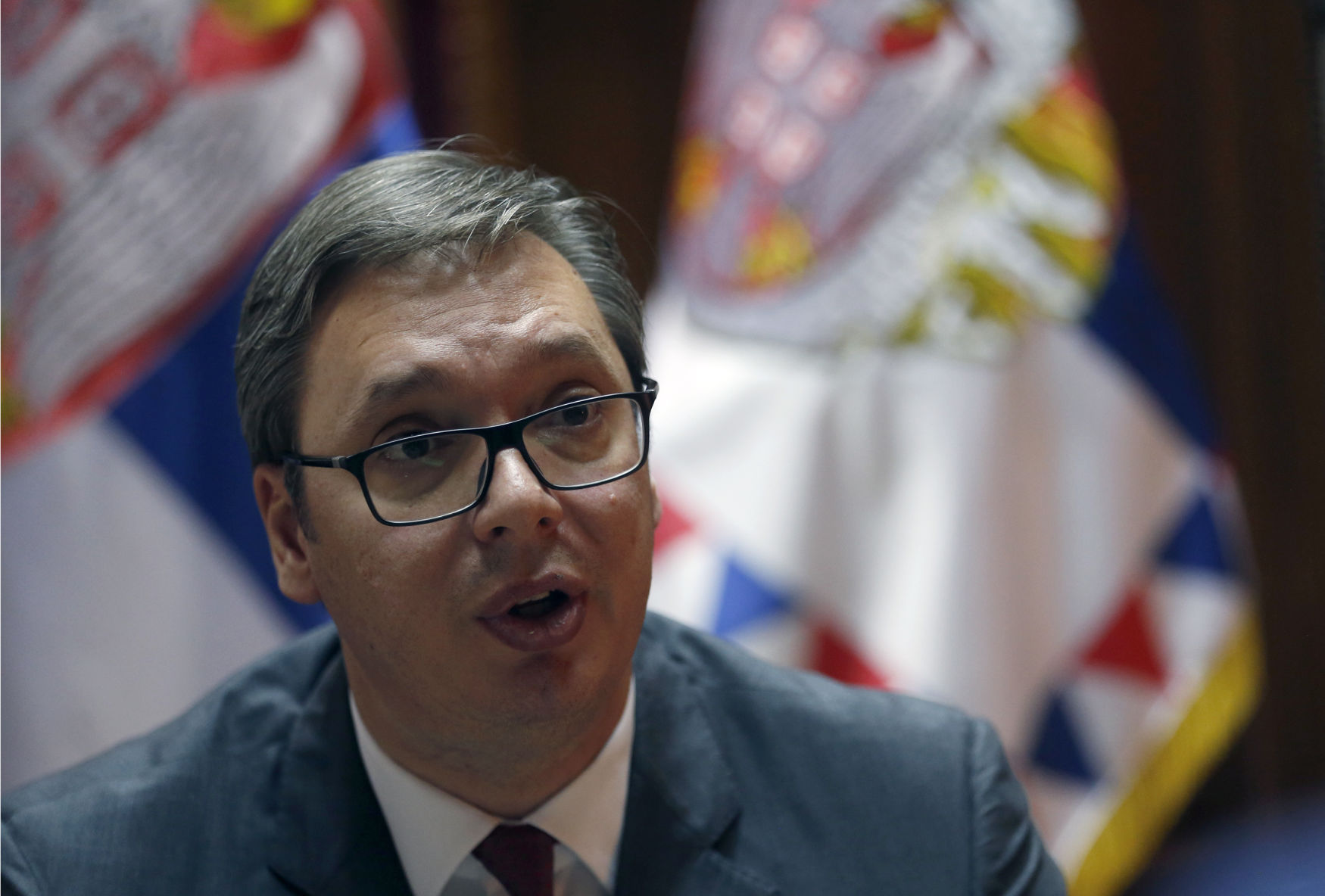BELGRADE, Serbia (AP) — Serbia’s president on Friday promised to lead the Balkan nation into the European Union and said the fact that Russia is arming the Serbian military doesn’t threaten that goal. President Aleksandar Vucic told The Associated Press
BELGRADE, Serbia (AP) — Serbia’s president on Friday promised to lead the Balkan nation into the European Union and said the fact that Russia is arming the Serbian military doesn’t threaten that goal.
President Aleksandar Vucic told The Associated Press in an interview that he wants to seek EU membership while at the same time maintaining strong ties with its traditional Slavic ally Russia and other world powers.
“We know where we are going, which means that we are on our EU path, that’s the strategic goal of our country,” he said, with the EU and Serbian flags behind him. “At the same time, we want to preserve the very best relations with Russia, Turkey, China, U.S. and all others.”
While seeking EU membership, there have been signs for some time that Serbia is edging closer to Russia which has been supplying Serbia with MiG-29 fighter jets, and plans to deliver battle tanks and armored vehicles, as Moscow seeks to increase its influence in the Balkans.
Some Western officials have voiced concern over Russia’s arming of Serbia in the wake of the bloody disintegration of former Yugoslavia in the 1990s, and have called on Belgrade to firmly say where it’s going, East or West.
“I see nothing wrong with that and it works, it will work, that’s our politics and we are militarily neutral,” Vucic said, adding that the arming of Serbia isn’t to threaten its neighbors.
“We do care about our own safety and security and that’s the reason why we bought two helicopters from Russia, nine helicopters from the Germans and French. That’s why we bought Russian interceptors (MiGs). That’s why we are going to buy something else from the other side. We do what is absolutely the best for our own country,” Vucic said.
Vucic acknowledged that his firebrand nationalist past as a ranking member of a party that strived for expansion of Serbian borders in the Balkans — or “Greater Serbia” — during the bloody wars with its neighbors has triggered some doubts about the sincerity of his switch to become a pro-Western reformer.
“The guy who was totally against the EU 20 years ago, the guy who was a member of the Radical Party … I know that it is not easy for many people to swallow,” Vucic said. “I can tell you now: we’ll deliver on that. We’ll finish that, we’ll finish the job.”
Vucic sought to downplay the fact that some members of the Serbian government and his close associates remain staunchly pro-Russian and anti-Western despite the proclaimed state direction. Vucic conceded that “there are people that like Russia more or less, which is part of our political stage, nothing strange and nothing new.”
“I think that every single member of the government does his or her best in fulfilling our goals and one of our main goals is our full-fledged EU membership. And that’s it,” he added. “I think that we need to be part of the European Union. That’s my task, that’s my job and I will do it.”
Vucic said that the biggest hurdle on Serbia’s path toward the EU is finding a solution for Kosovo, the former majority ethnic-Albanian Serbian province that declared independence in 2008 which Serbia doesn’t recognize. The EU is mediating talks on normalizing relations between Belgrade and Pristina and many in Europe believe that Serbia will need to accept Kosovo’s statehood before joining the bloc.
Vucic has initiated a so-called internal discussion in Serbia on Kosovo with an apparent aim to prepare the public for a future agreement that could settle the ethnic dispute which led to a war in 1998-99 that was stopped only after a 78-day NATO bombardment. Many Serbs consider Kosovo the cradle of Serbia’s statehood and would never agree to anything else but full control.
“We have a frozen conflict for many years. Is it good to have that conflict frozen for the next 50 years or next 100 years? I don’t think so. And that was the main reason why I launched this internal discussion,” Vucic said.
“With Albanians, I think we need a long-lasting peace arrangement for the next 200 years,” he said, adding that all sides “will have to make some compromises.”
Vucic’s critics have accused him of autocratic rule, including stifling the media through intimidation and financial pressure. They say the West has turned a blind eye to his undemocratic policies at home as long as he keeps peace in the Balkans.
Vucic denied the accusations in the interview, arguing that under his leadership, Serbia has amended media laws in accordance with EU standards.
He said Serbia has “a kind of split media scene, there are no unanimous voices and I am very proud of that.”
“And we have no limits, no restrictions on any of the social networks, unlike many Western European countries,” Vucic said. “We have 78 to 79 percent of our population using social networks. People just have their phones. And they have all different news in their phones.”




